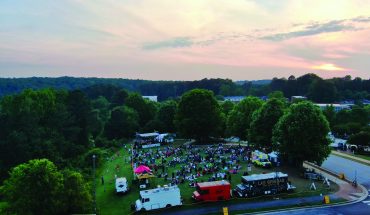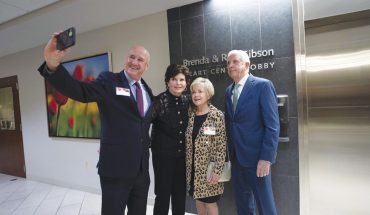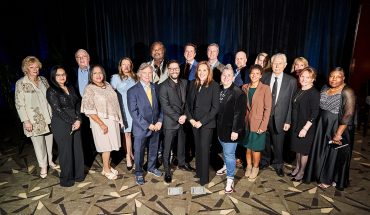photographs by Joseph Rafferty
Bestselling author Lee Smith’s adoring fans were out in force on the first day in May for Walter’s Book Club at the Umstead. The hotel’s ballroom was filled with 250 readers, all eager to hear Smith read from her latest book, Dimestore: A Writer’s Life, and to spend an afternoon with their favorite writer at an elegant Sunday luncheon.
The book, which Smith describes as “a love song to every small town in America,” is her first memoir. Her novels, 13 in all, have earned her legions of readers everywhere, as well as multiple awards, including the O. Henry Award, the American Academy of Arts and Letters award for fiction, and the North Carolina Award for literature.
As champagne was passed, readers, who included UNC President Margaret Spellings and N.C. State Treasurer Janet Cowell, compared notes. Many had already read Dimestore, which was published in March. The book centers on Smith’s childhood in the mountain coal mining town of Grundy, Va., and the dimestore her father owned and ran there. It’s about a bygone era, and it’s also about coming of age, finding a path, love, chaos, motherhood, and resilience. The author Roy Blount Jr. summed it up: “You know how in Lee Smith’s fiction there’s always something so fresh, crazy, and loving? In Dimestore,” he says, “is the essence of Lee.”
That essence, Smith told the crowd, owes a huge amount to the mountain culture she grew up in, which shaped her as a person and as a writer.
“The kind of writer we become has to do with how we first hear language,” she told the audience, “and under what circumstances.” For Smith, those circumstances included the stories she heard her father and other family members tell. “The mountain culture I was born into is a very specific culture, because it’s a real storytelling culture,” she said. “Even today, I think that I’m not much of a writer, or a writerly writer. I’m much more of a storyteller. Nobody in my family was really reading too many books. But they were really telling some world-class stories, and they were world-class storytellers.”
She described her writing process in near-mystical terms. “Stories, when I’m writing them, come to me in a human voice,” she said. “It’s like I just think about them a long time, and they just come to me, and all I have to do is write them down. I hear the voice of the narrator in my ear, and it’s usually the main character in the story … sometimes it seems to be the voice of the story itself. But I just try to pay attention. And write it down. “
Writing nonfiction, on the other hand, forced her to draw from real voices and real life. The process of writing it for the first time, she said, was meaningful. “The great gift of writing nonfiction is something I never would have known had I not tried to do it,” she said. “And that is that the more you write, the more you remember … At my age now, this is the huge gift.”
But some of what Smith remembered and writes about in Dimestore is sad – even tragic – including the mental illness that plagued both of her parents and her son. She told the group that it was important to tell those stories, too.
“My father was what would now be called bipolar, and my mother suffered too from depression and anxiety,” she said, “and when I was a little girl, they were very often in the hospital, usually one or the other. There was only one year when I lived for a whole year with my Aunt Millie, up in Maryland. And that’s a part of the family, too. I was very interested in writing about that, and about my son Josh’s schitzophrenia. Because I think that these are illnesses that touch all of us … They happen to us, affecting two out of five families in this country, and I think it’s really important to talk about them.”
Communities need to support “these most vulnerable members,” Smith said, just as the town of Grundy and her wider family supported Smith and her parents when they were ill, and how the town of Chapel Hill also rallied to support her son Josh.
An entirely different slice of real life inspired the passage Smith chose to read to the group. The gist was familiar even to those who hadn’t yet read Dimestore, because the experience served as fodder for Smith’s New York Times bestseller The Last Girls: An actual trip Smith took with a group of classmates following their college graduation.
“Fifty years ago this month,” she told the group, “I went down the Mississippi River in a raft with my classmates from Hollins. I cannot believe our parents let us do it. I can’t believe we didn’t die.”
Taking their cue from Huckleberry Finn, the group of young women – referred to in that era as “girls” by themselves and everyone around them – did the extraordinary and unlikely thing of making a raft with their own hands and setting out on a many-day voyage down the river (with an experienced captain). It was their blithe disregard of the dangers of such a junket she remembers with fondness and disbelief.
“If anything really bad happened to us, we figured we could call up our parents collect and they would come and fix things,” she read from the book. “We expected to be taken care of. Nobody had yet suggested to us that we might ever have to make a living, or that somebody wouldn’t marry us and then look after us for the rest of our lives. We all smoked cigarettes; we were all cute. We headed down that river with absolute confidence that we would get where we were going. We worked and fished and played cards, and talked and talked and talked. It was wonderful.”
What did she learn on that improbable voyage? “Not much. Only that if you were cute, and you sing a lot of songs, people come out wherever you dock and bring you pound cake, and ham, and beer, and keys to the city. And when you get to New Orleans you will be met by the band from Preservation Hall on a tugboat, and showered by red roses, dropped from a helicopter, paid for by somebody’s daddy.”
She and her friends, she said, “were the last girls.”
Her 50th Hollins reunion, she recalled, brought home the truth that the reality of life was slightly different than she might have predicted as she disembarked from that raft in 1966. “Life has turned out to be wild and various, full of the unexpected,” she said. “And it’s a monstrous big river out there.”
Luckily for her fans, that river is supplying Smith with more stories to tell. She hinted at the possibility of another memoir: “I’ve got more,” she said. “There’s a lot more stuff that’s not even in (Dimestore) that I’ve been writing ever since.”














